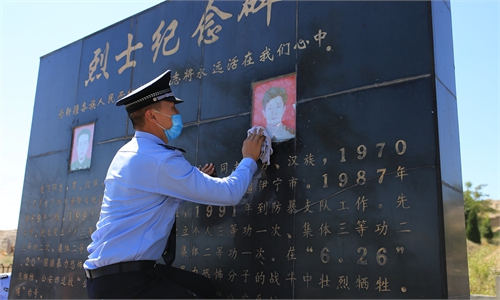Exclusive: How Xinjiang regained peace & stability – Police sacrifice, officials' devotion, residents' yearning for happy lives
Police sacrifice, officials' devotion, residents' yearning for happy life
Amid the loud music in the night market of the Hotan Prefecture, Mulat Shirfujan, deputy director of the local public security bureau, stands out in the noisy environment. The 45-year-old police officer, who is called "the dessert falcon," has fought on the anti-terrorism front line for more than 20 years.
The officer shared with the Global Times his stories of leading the operations to crack down on terrorism and extremism in Hotan, Northwest China's Xinjiang Uygur Autonomous Region, which shed some light on the reasons why no violent attacks have occurred in the region again in recent years.
This is the second piece in a series of exclusive stories from the Global Times showcasing the heroic storis of police officers fighting against terrorism, the tragic details of terror attacks, and the great sacrifices that have been made by people from all ethnic groups in Xinjiang to restore peace and stability.
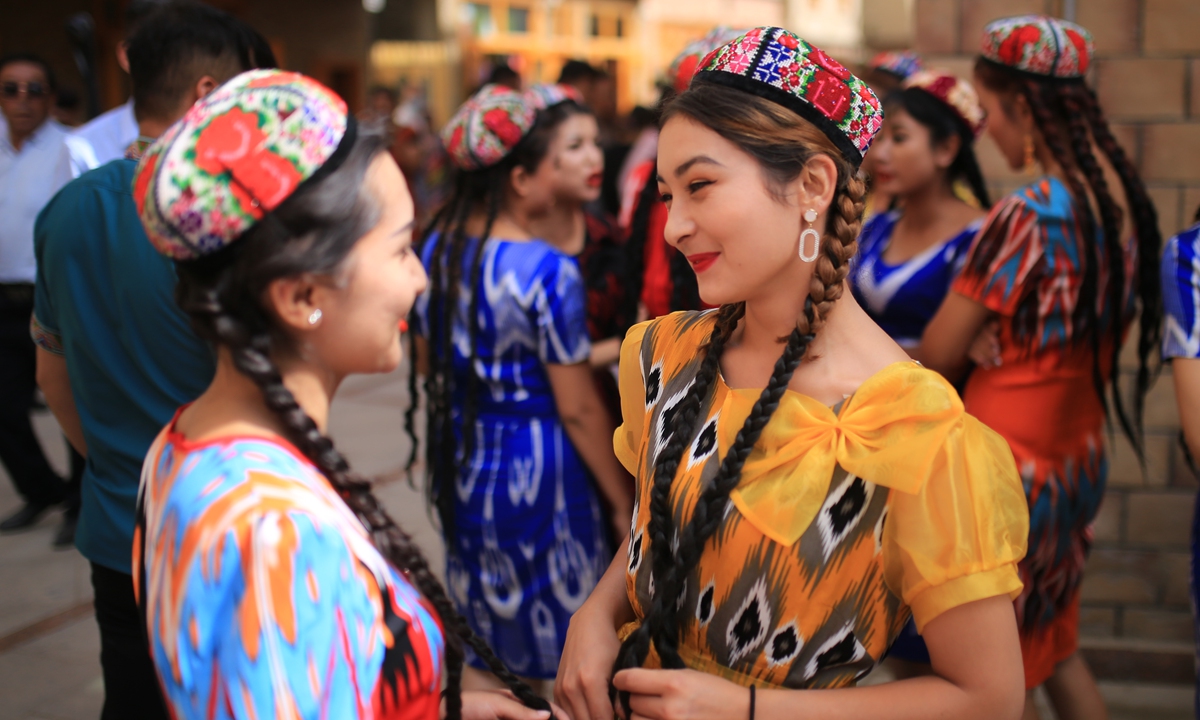
Western double standards on terrorism gave rise to Xinjiang instability
For foreigners and people who visit Xinjiang, a tour to the Urumqi International Convention Center where an anti-terrorism exhibition is displayed may help them fill in the blanks of knowledge on how "the three evil forces" - terrorism, extremism, and separatism - had scourged the region since 1990s until 2016 with thousands of acts of terror.
"Many foreign visitors came to view the exhibition and most of them were shocked by the brutality of terrorists and the frequency of terror attacks in the region, and some even shed tears," a staff member told the Global Times, noting that the exhibition has become a window for foreign visitors and diplomats to know the truth of Xinjiang.
"But there were some Western journalists who refused to visit, claiming that this is 'moral abduction' and would compromise their 'objective' judgment. I was furious at such remarks for they refused to know the truth of Xinjiang!" said a staff member.
Selected from thousands of terror attacks that have happened in the region, the terror attacks displayed at the exhibition are listed chronologically with introductions, photos, and sometimes video footages beside each display. One of the attacks on display occurred in Baren township, which was plotted and carried out by the "Turkistan Islamic Party" in 1990; another happened in Moyu county on December 28, 2016 when four terrorists raided the building of the Party committee.
By reviewing all the displayed terror attacks, the Global Times noted that there were two periods of time with more attacks - around the 9/11 attacks in 2001 and the terror attack on July 5, 2009 in Urumqi.
The 9/11 attack helped the international community to reach a higher consensus on the fight against terrorism, which led to a crackdown on terrorist organizations, including the "East Turkistan Islamic Movement (ETIM)," Li Wei, an expert on national security and anti-terrorism at the China Institute of Contemporary International Relations, told the Global Times.
"But sadly, it did not last long. Terrorist organizations saw through the global anti-terrorism problems; for example the double standards adopted by the West and the fact that some Western countries are using terrorism as a tool for political gain. This is why ETIM believed that as long as they had terror attacks targeting China, they would get support from the West," Li said.
Many terrorist organizations sought "transformation" since 2001. For example, the "World Uyghur Congress" (WUC), a US-based anti-China organization established in 2004, was transformed from the "World Uyghur Youth Congress" (WUYC) - a terrorist organization categorized as such by Chinese authorities. Dolkun Isa, leader of the WUC, was also from the WUYC.
The main members of the WUYC and its affiliated organizations were actively engaged in terrorist activities. After the WUC rebranding efforts, terror attacks reached a climax in Xinjiang. After the terror attack in Urumqi on July 5, 2009, there were more terror attacks happening more frequently in China as a result of the "three evil forces" in and outside of China colluding together, Li noted.
Statistics shown at the anti-terrorism exhibition highlighted the close ties between terror attacks and outside forces. From 2014 to 2018, online information about terrorist and extremist propaganda and violent audio and video clips captured by authorities rose sharply before plummeting, and the climax appeared between 2016 and 2017 with 27,211 network-related bits of such information and 4,473 audio and video clips of violence seized.
"From 2014 to 2016, a large number of terror attacks happened in Xinjiang under the collusion of domestic and overseas forces and this is why we captured an increasing number of online terrorist propaganda materials," Li said, noting that due to the anti-terrorism measures taken since 2017, the three evil forces have since been cracked down upon, leading to a decrease in online terrorist information exchanges.
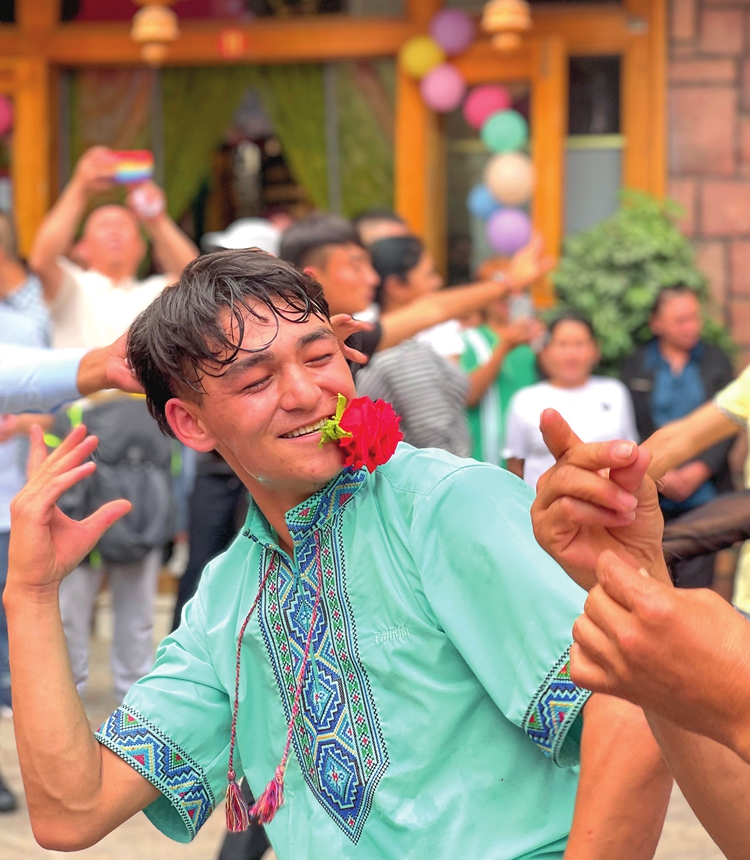
Compared to terrorists who plotted and committed terror attacks, other groups in the shadows are even more destructive - the "two-faced people" in government agencies who acted as a protective umbrella for the three evil forces.
The former head of Shache county in Kashi Prefecture Ehait Shayt, for instance, claimed himself to be the "King of Shache" and offered convenience for extremists to spread extremist ideas. He also turned a blind eye on illegal religious individuals' interference into local residents' daily lives.
"Before the terror attack on July 28, 2014 in Shache, Ehait had received a tip-off, but he did not report it to higher-level authorities. He planned to deal with the terrorists after they had started the attacks in order to get a promotion," Nurmemet Wubul, head of Ailixihu town in Kashi, who participated in dealing with the July 28 terror attack, told the Global Times.
Ehait was arrogant and interfered with law enforcement, Nurmemet said, noting that with Ehait being a protective umbrella, Shache county entered a period awash with extremism.
Ehait was only a minor official, but Shirzat Bawudun, a former high-ranking official in the region who was later found to be secretly supporting extremist activities linked to ETIM, was the "big fish" among the two-faced group.
At the anti-terrorism exhibition in Urumqi, some two-faced people that had hidden their intentions to destroy Xinjiang's anti-terrorism work, were listed on a board covering a whole wall.
Police search for terrorist explosives with bare hands
While the exhibition brings a general impression on terrorism for visitor, Mulat, a local police officer in Hotan, experienced it.
On April 23, 2014, local police received tip-offs that a group of terrorists were making explosive devices and preparing to conduct terror attacks across different sites. Mulat led a team to monitor the terrorists' lair.
In order to know the situation in and outside the house, Mulat crawled toward the house from the grain field nearby. "It was around 4 am in the morning. I slowly crawled into the yard of the house and cautiously observed the environment, trying to spot where they had buried the explosive devices," Mulat told the Global Times.
After 40-minute drive from downtown, Mulat took the Global Times reporters to the terrorists' hideout - the house had been demolished with some stones remaining. It was near the road with a grain field out back.
Mulat said that they recovered more than 200 explosive devices from the yard. "There were gas explosives with an explosion radius of up to 20 to 30 meters. When I crawled into the yard, I could only search the ground with my bare hand due to the darkness and put bricks to mark the places where the soil was soft," he said.
He spent more than an hour in the yard and reported the situation to command.
In response to why he chose to inspect the yard, Mulat said "I am the team leader and had the experience. The other members in our team were young. We couldn't send more people for the work since it would have likely alarmed the terrorists."
Mulat said that his family had not known about the case until they learned about it from the local news. "My wife cried when she found out what I had been doing. I knew she worried about me. But this is my duty."
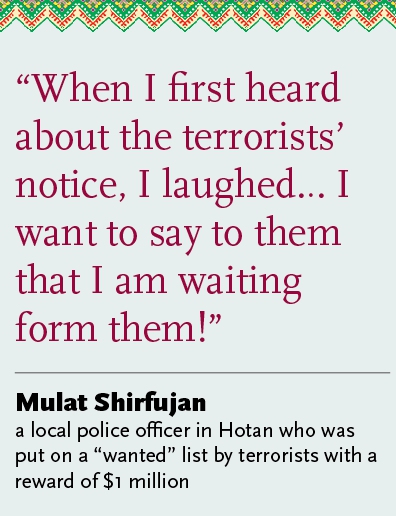
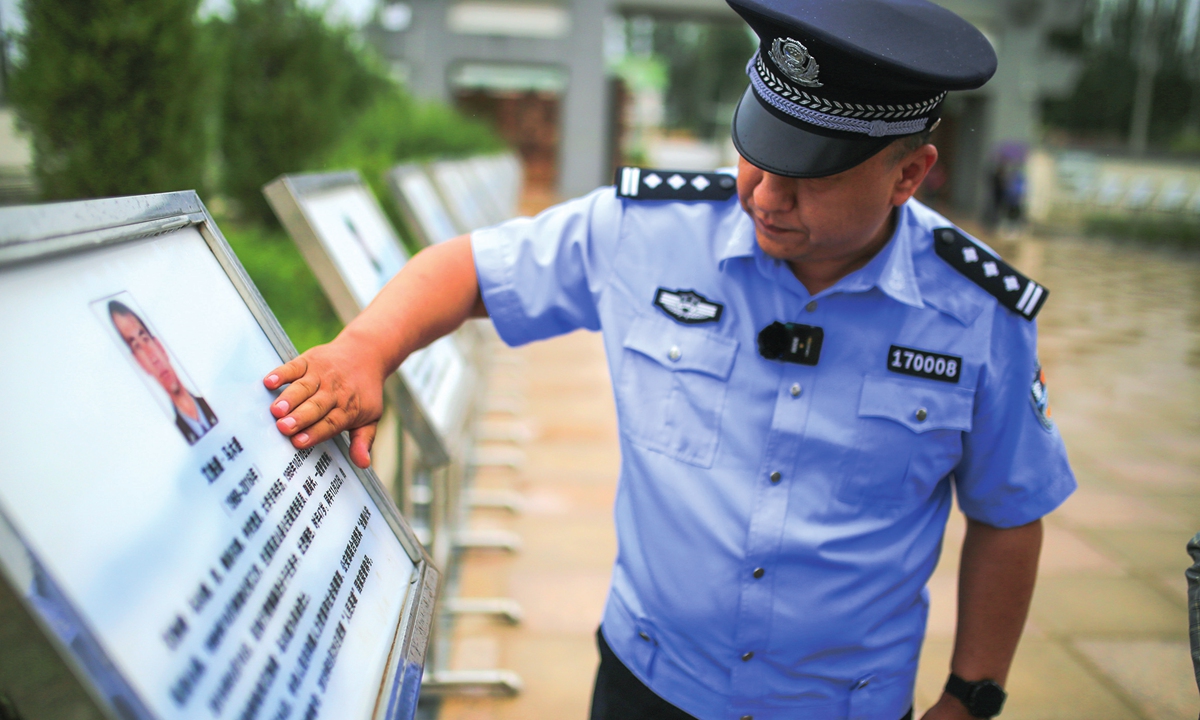
In November 2016, the ETIM terrorist organization released a notice, calling Mulat a "traitor" and "heretic," and offered to reward $1 million for Mulat's head.
"When I first heard about the terrorists' notice, I laughed. It showed that we had touched a nerve and it increased our confidence in cracking down on terrorism. I want to say to them that I am waiting form them!" Mulat said.
When he appeared in a documentary on anti-terrorism, Mulat chose not to have his face concealed. "I knew that some of my family members would worry about my safety. But we have all witnessed the damage brought by the three evil forces and as a police officer I must stand up to fight against them till the end. I am not afraid of them as people of all ethnic groups in Xinjiang are our strongest support," he said.
Promoting understanding as a Uygur CPC official
Besides fighting terrorists head-on, Xinjiang has also sent officials to the grass roots to eradicate the soil of terrorism and extremism. Xu Guixiang, the regional spokesperson, told the Global Times that all the residents and officials have been involved in implementing the anti-terrorism measures.
"International terrorism always uses the banner of religion to promote extremist thought and a small group of separatists have also used ethnic identity to coax young people into extremism. These separatists then colluded with international terrorists and learned from them to use distorted religion to fool people. They promote the thought of 'conducting jihadist acts in order to go to heaven.' This is why we saw more suicide terrorist attacks after July 5, 2009," Li told the Global Times.
This is why China took on anti-terrorism and de-radicalization work at the same time, he said.
For places where terror attacks have happened, de-radicalization work needs more patience and wisdom from local officials.
Nurmemet Wubul is the head of Ailixihu town in Shache county. On July 28, 2014, Nurmemet, who was head of the security team at the public security bureau in Shache, participated in countering the terror attack and sustained severe injuries.
Nurmemet said that the biggest challenge for him as the head of the town is how to help local residents shake off the influence of extremism.
"I was nervous and also confused when being deployed to the town," Nurmemet said, noting that he had worked in the public security system since he started working and lacked grassroots experience.
"I also asked myself why I was sent here. Then I realized that as a Uygur and member of the Communist Party of China (CPC), I knew the place better and had a linguistic advantage. My 18-year work experience in public security also offers me better knowledge of laws and their promotion in the place to correct local residents' wrong understanding of religion and laws," said Nurmemet.
Nurmemet said he also made it clear for all officials in the town that without changing the extremism environment in the town, no other field could see any development and neither would local residents have a better life.
"At the beginning, when we went to the villages to promote policies and laws, a woman saw us and she went inside her house and locked the door. Another villager let us go into the yard but ignored us as though we were nothing but the air," Nurmemet said.
The official said that at first he was angry but later "I realized that local residents are not well educated and this is why it is important to promote the policies and laws to them. I fully used my linguistic advantages and met with villagers to chat with them and help them with everything they need. Gradually, they began to talk to me and recognized my efforts. More importantly, they realized that their lives were becoming better," said Nurmemet.
In recent years, forming family-like close ties with residents of all ethnic groups and visiting each other have become a part of the daily life in Xinjiang. For grassroots officials who have been stationed in villages, getting a suntan from learning and knowing all the details about agriculture is like a passing grade.
"Much of our work is related to the fundamental interests of the whole nation. Our officials should first have political responsibility and treat the job with a sense of mission and always remember that we are the members of the Party," Xu told the Global Times.
"As every official is thinking about the whole situation for the long-term stability of the region, the official group in Xinjiang is strong in unity and ready to fight hard battles," Xu noted.
The officer shared with the Global Times his stories of leading the operations to crack down on terrorism and extremism in Hotan, Northwest China's Xinjiang Uygur Autonomous Region, which shed some light on the reasons why no violent attacks have occurred in the region again in recent years.
This is the second piece in a series of exclusive stories from the Global Times showcasing the heroic storis of police officers fighting against terrorism, the tragic details of terror attacks, and the great sacrifices that have been made by people from all ethnic groups in Xinjiang to restore peace and stability.

Women in traditional garb chat during a break from a group dance during the Corban Festival in Hotan. Photo: Liu Xin, Fan Lingzhi/GT
Western double standards on terrorism gave rise to Xinjiang instability
For foreigners and people who visit Xinjiang, a tour to the Urumqi International Convention Center where an anti-terrorism exhibition is displayed may help them fill in the blanks of knowledge on how "the three evil forces" - terrorism, extremism, and separatism - had scourged the region since 1990s until 2016 with thousands of acts of terror.
"Many foreign visitors came to view the exhibition and most of them were shocked by the brutality of terrorists and the frequency of terror attacks in the region, and some even shed tears," a staff member told the Global Times, noting that the exhibition has become a window for foreign visitors and diplomats to know the truth of Xinjiang.
"But there were some Western journalists who refused to visit, claiming that this is 'moral abduction' and would compromise their 'objective' judgment. I was furious at such remarks for they refused to know the truth of Xinjiang!" said a staff member.
Selected from thousands of terror attacks that have happened in the region, the terror attacks displayed at the exhibition are listed chronologically with introductions, photos, and sometimes video footages beside each display. One of the attacks on display occurred in Baren township, which was plotted and carried out by the "Turkistan Islamic Party" in 1990; another happened in Moyu county on December 28, 2016 when four terrorists raided the building of the Party committee.
By reviewing all the displayed terror attacks, the Global Times noted that there were two periods of time with more attacks - around the 9/11 attacks in 2001 and the terror attack on July 5, 2009 in Urumqi.
The 9/11 attack helped the international community to reach a higher consensus on the fight against terrorism, which led to a crackdown on terrorist organizations, including the "East Turkistan Islamic Movement (ETIM)," Li Wei, an expert on national security and anti-terrorism at the China Institute of Contemporary International Relations, told the Global Times.
"But sadly, it did not last long. Terrorist organizations saw through the global anti-terrorism problems; for example the double standards adopted by the West and the fact that some Western countries are using terrorism as a tool for political gain. This is why ETIM believed that as long as they had terror attacks targeting China, they would get support from the West," Li said.
Many terrorist organizations sought "transformation" since 2001. For example, the "World Uyghur Congress" (WUC), a US-based anti-China organization established in 2004, was transformed from the "World Uyghur Youth Congress" (WUYC) - a terrorist organization categorized as such by Chinese authorities. Dolkun Isa, leader of the WUC, was also from the WUYC.
The main members of the WUYC and its affiliated organizations were actively engaged in terrorist activities. After the WUC rebranding efforts, terror attacks reached a climax in Xinjiang. After the terror attack in Urumqi on July 5, 2009, there were more terror attacks happening more frequently in China as a result of the "three evil forces" in and outside of China colluding together, Li noted.
Statistics shown at the anti-terrorism exhibition highlighted the close ties between terror attacks and outside forces. From 2014 to 2018, online information about terrorist and extremist propaganda and violent audio and video clips captured by authorities rose sharply before plummeting, and the climax appeared between 2016 and 2017 with 27,211 network-related bits of such information and 4,473 audio and video clips of violence seized.
"From 2014 to 2016, a large number of terror attacks happened in Xinjiang under the collusion of domestic and overseas forces and this is why we captured an increasing number of online terrorist propaganda materials," Li said, noting that due to the anti-terrorism measures taken since 2017, the three evil forces have since been cracked down upon, leading to a decrease in online terrorist information exchanges.

A local resident in Hotan Prefecture dances during the Corban Festival in July. Photo: Liu Xin, Fan Lingzhi/GT
Compared to terrorists who plotted and committed terror attacks, other groups in the shadows are even more destructive - the "two-faced people" in government agencies who acted as a protective umbrella for the three evil forces.
The former head of Shache county in Kashi Prefecture Ehait Shayt, for instance, claimed himself to be the "King of Shache" and offered convenience for extremists to spread extremist ideas. He also turned a blind eye on illegal religious individuals' interference into local residents' daily lives.
"Before the terror attack on July 28, 2014 in Shache, Ehait had received a tip-off, but he did not report it to higher-level authorities. He planned to deal with the terrorists after they had started the attacks in order to get a promotion," Nurmemet Wubul, head of Ailixihu town in Kashi, who participated in dealing with the July 28 terror attack, told the Global Times.
Ehait was arrogant and interfered with law enforcement, Nurmemet said, noting that with Ehait being a protective umbrella, Shache county entered a period awash with extremism.
Ehait was only a minor official, but Shirzat Bawudun, a former high-ranking official in the region who was later found to be secretly supporting extremist activities linked to ETIM, was the "big fish" among the two-faced group.
At the anti-terrorism exhibition in Urumqi, some two-faced people that had hidden their intentions to destroy Xinjiang's anti-terrorism work, were listed on a board covering a whole wall.
Police search for terrorist explosives with bare hands
While the exhibition brings a general impression on terrorism for visitor, Mulat, a local police officer in Hotan, experienced it.
On April 23, 2014, local police received tip-offs that a group of terrorists were making explosive devices and preparing to conduct terror attacks across different sites. Mulat led a team to monitor the terrorists' lair.
In order to know the situation in and outside the house, Mulat crawled toward the house from the grain field nearby. "It was around 4 am in the morning. I slowly crawled into the yard of the house and cautiously observed the environment, trying to spot where they had buried the explosive devices," Mulat told the Global Times.
After 40-minute drive from downtown, Mulat took the Global Times reporters to the terrorists' hideout - the house had been demolished with some stones remaining. It was near the road with a grain field out back.
Mulat said that they recovered more than 200 explosive devices from the yard. "There were gas explosives with an explosion radius of up to 20 to 30 meters. When I crawled into the yard, I could only search the ground with my bare hand due to the darkness and put bricks to mark the places where the soil was soft," he said.
He spent more than an hour in the yard and reported the situation to command.
In response to why he chose to inspect the yard, Mulat said "I am the team leader and had the experience. The other members in our team were young. We couldn't send more people for the work since it would have likely alarmed the terrorists."
Mulat said that his family had not known about the case until they learned about it from the local news. "My wife cried when she found out what I had been doing. I knew she worried about me. But this is my duty."


Mulat Shirfujan, deputy director of the public security bureau in Hotan, wipes rain drops from the photo of his friend who died in an anti-terrorism operation. Photo: Liu Xin, Fan Lingzhi/GT
In November 2016, the ETIM terrorist organization released a notice, calling Mulat a "traitor" and "heretic," and offered to reward $1 million for Mulat's head.
"When I first heard about the terrorists' notice, I laughed. It showed that we had touched a nerve and it increased our confidence in cracking down on terrorism. I want to say to them that I am waiting form them!" Mulat said.
When he appeared in a documentary on anti-terrorism, Mulat chose not to have his face concealed. "I knew that some of my family members would worry about my safety. But we have all witnessed the damage brought by the three evil forces and as a police officer I must stand up to fight against them till the end. I am not afraid of them as people of all ethnic groups in Xinjiang are our strongest support," he said.
Promoting understanding as a Uygur CPC official
Besides fighting terrorists head-on, Xinjiang has also sent officials to the grass roots to eradicate the soil of terrorism and extremism. Xu Guixiang, the regional spokesperson, told the Global Times that all the residents and officials have been involved in implementing the anti-terrorism measures.
"International terrorism always uses the banner of religion to promote extremist thought and a small group of separatists have also used ethnic identity to coax young people into extremism. These separatists then colluded with international terrorists and learned from them to use distorted religion to fool people. They promote the thought of 'conducting jihadist acts in order to go to heaven.' This is why we saw more suicide terrorist attacks after July 5, 2009," Li told the Global Times.
This is why China took on anti-terrorism and de-radicalization work at the same time, he said.
For places where terror attacks have happened, de-radicalization work needs more patience and wisdom from local officials.
Nurmemet Wubul is the head of Ailixihu town in Shache county. On July 28, 2014, Nurmemet, who was head of the security team at the public security bureau in Shache, participated in countering the terror attack and sustained severe injuries.
Nurmemet said that the biggest challenge for him as the head of the town is how to help local residents shake off the influence of extremism.
"I was nervous and also confused when being deployed to the town," Nurmemet said, noting that he had worked in the public security system since he started working and lacked grassroots experience.
"I also asked myself why I was sent here. Then I realized that as a Uygur and member of the Communist Party of China (CPC), I knew the place better and had a linguistic advantage. My 18-year work experience in public security also offers me better knowledge of laws and their promotion in the place to correct local residents' wrong understanding of religion and laws," said Nurmemet.
Nurmemet said he also made it clear for all officials in the town that without changing the extremism environment in the town, no other field could see any development and neither would local residents have a better life.
"At the beginning, when we went to the villages to promote policies and laws, a woman saw us and she went inside her house and locked the door. Another villager let us go into the yard but ignored us as though we were nothing but the air," Nurmemet said.
The official said that at first he was angry but later "I realized that local residents are not well educated and this is why it is important to promote the policies and laws to them. I fully used my linguistic advantages and met with villagers to chat with them and help them with everything they need. Gradually, they began to talk to me and recognized my efforts. More importantly, they realized that their lives were becoming better," said Nurmemet.
In recent years, forming family-like close ties with residents of all ethnic groups and visiting each other have become a part of the daily life in Xinjiang. For grassroots officials who have been stationed in villages, getting a suntan from learning and knowing all the details about agriculture is like a passing grade.
"Much of our work is related to the fundamental interests of the whole nation. Our officials should first have political responsibility and treat the job with a sense of mission and always remember that we are the members of the Party," Xu told the Global Times.
"As every official is thinking about the whole situation for the long-term stability of the region, the official group in Xinjiang is strong in unity and ready to fight hard battles," Xu noted.


